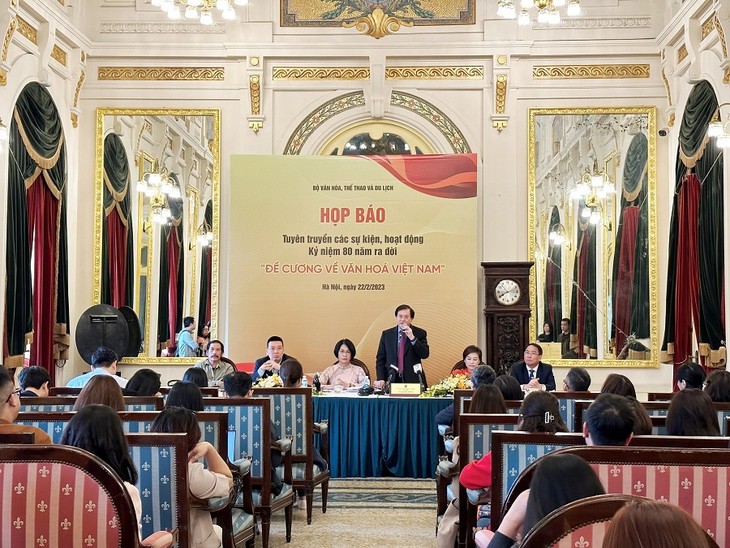(VOVWORLD) - Vietnam is aiming to promote an advanced culture embracing national identity and absorbing the cultural quintessence of mankind. Vietnam is investing in culture and arts and also in human development to ensure sustainable socio-economic development. These activities are inspired and specified in the 1943 Outline of Vietnamese culture.
 At a press conference to announce activities to celebrate the 80th anniversary of the Party's Outline of Vietnamese Culture (Photo: VGP) At a press conference to announce activities to celebrate the 80th anniversary of the Party's Outline of Vietnamese Culture (Photo: VGP) |
The Resolution of the Vong La Conference in February 1943, in volume 7 of the Complete Document of the Communist Party of Vietnam, states: "The Party needs to send professional cadres to work on culture in order to promote a cultural movement of national salvation to fight against the backward fascist culture.” The conference adopted the 1943 Outline of Vietnamese culture covering five basic contents: Preamble; History and Traits of Vietnamese culture; Vietnamese culture at risk under the Japanese and French fascist yoke; Vietnam's cultural revolution; and Urgent tasks of Marxist culturalists.
Lodestar
In the 1943 Outline of Vietnamese Culture, for the first time, the Communist Party of Vietnam outlined three development periods of Vietnamese cultural history and identified the cultural trends of each period with specific characteristics, scope, and roles. The Party also set out for the first time a scientific, revolutionary outlook on life, and a materialist dialectical methodology on national culture, and highlighted the role and position of culture as one of the three major fronts: politics, economy, and culture and as the endogenous strength, the spiritual foundation of society.
The Party set forth three principles to promote the development of national culture, including "Nationalization; Massification; Scientifization" and pointed out the "essential tasks" of Marxist culturalists covering "immediate goals", "work to be done" and "how to mobilize" to develop national culture and the nation.
Professor Phong Le, former Director of the Institute of Literature, Vietnam Academy of Social Sciences, said: "The Party's 1943 Outline of Vietnamese Culture clearly states the importance of paying attention to politics, economics, and culture. Those are the three areas that communists must master. The 1943 Outline of Vietnamese Culture also includes theories on culture, ideology, academia, art and intellectuality. In fact, the first Provisional Government led by President Ho Chi Minh brought together all the best Vietnamese intellectuals at that time."
Thus, the Outline of Vietnamese Culture serves as a guide for the development of Vietnamese national culture. It is a bright "torch" , a cultural platform for the national liberation revolution and the development of Vietnamese culture. At the first National Cultural Conference in Hanoi on November 24, 1946, President Ho Chi Minh emphasized the role of culture in national construction, defense, and development affirming the view that "Culture lights the way for the nation to go".
Light the way for the nation to go
Promoting the spirit of the 1943 Outline of Vietnamese Culture, the Communist Party of Vietnam has adopted several strategies on Vietnamese culture for each period. During the renewal period, the Party issued a Resolution on building and developing an advanced Vietnamese culture embracing national identity (Resolution 03 dated July 16, 1998 at the 5th Plenum of the 8th Party Central Committee). During the period of globalization, international integration, national construction and defense, the Party issued a Resolution on building and developing Vietnamese culture and people to meet the requirements of sustainable national development (Resolution 33, dated June 9, 2014 at the 9th Plenum of the 11th Party Central Committee).
These resolutions on culture expanded the 1943 Outline of Vietnamese Culture to cover ideology, morality, and lifestyle; cultural environment; education and training; science and technology; arts and literature; information; cultural exchange with foreign countries; and cultural institutions. The role of culture and the concept of national cultural development became more complete and comprehensive. Culture is defined as the spiritual foundation of society, the goal and the driving force for socio-economic development.
Under these documents, the Party must lead the cultural movement. At the second National Cultural Conference on November 24, 2021, Party General Secretary Nguyen Phu Trong said the Communist Party of Vietnam always attaches importance to the role of culture which is the soul and identity of the nation. “The culture remains, the nation remains”.
Former Vice Chairman of the Central Theoretical Council Professor Dr. Vu Van Hien said: "Party General Secretary Nguyen Phu Trong emphasized that the Communist Party of Vietnam is becoming more aware of the importance of culture. It’s necessary to create conditions and breakthroughs and be creative to enhance the development of culture, especially in the context of international integration and the country’s growing international status."
Amid Vietnam’s rapid international integration, Vietnam aims to develop an advanced culture embracing national identity and absorbing the cultural quintessence of mankind. When it comes to investment in culture and arts, it is an investment in people for sustainable socio-economic development. Cultural revolution is carried out to achieve the goal of a rich people, a strong country, a just, democratic and civilized society steadily moving toward socialism. All these come from the principles "Nationalization; Massification; Scientifization” highlighted in the 1943 Outline of Vietnamese Culture.”